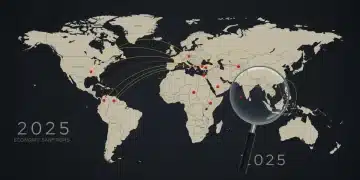Genomic Sequencing: 2025 Applications & Ethical Debates

Genomic sequencing is rapidly transforming medicine, agriculture, and forensics in 2025, offering unprecedented insights while simultaneously igniting critical ethical discussions on data privacy, equitable access, and societal implications.
The landscape of modern science and medicine is currently being reshaped by the rapid advancements in Genomic Sequencing in Action: Real-World Applications and Ethical Debates for 2025 (INSIDER KNOWLEDGE). This groundbreaking technology, once a costly and time-consuming endeavor, has now become an accessible tool, driving innovations across diverse sectors.
The Accelerating Pace of Genomic Sequencing
The year 2025 marks a pivotal moment for genomic sequencing, with costs plummeting and processing speeds escalating to unprecedented levels. This acceleration is not merely a technical achievement; it is fundamentally altering how we approach health, disease, and even environmental challenges.
Recent breakthroughs in next-generation sequencing (NGS) technologies have enabled the complete sequencing of a human genome in mere hours, a stark contrast to the months or even years it took just a decade ago. This speed allows for real-time applications in clinical settings and rapid response to public health crises, as evidenced by ongoing research.
Technological Advancements Driving Progress
The core of this rapid progress lies in several key technological developments. These include innovations in semiconductor-based sequencing, nanopore sequencing, and advanced bioinformatics algorithms that can process vast amounts of genetic data efficiently.
- Reduced Cost: The price per genome continues to fall, making sequencing more accessible for research and clinical use.
- Increased Speed: High-throughput platforms can process multiple genomes simultaneously, dramatically reducing turnaround times.
- Enhanced Accuracy: Improved error correction and longer read lengths contribute to more precise genetic information.
- Data Management: Sophisticated AI and machine learning tools are now essential for interpreting the complex data generated.
These advancements are not isolated; they are interconnected, each pushing the boundaries of what is possible in genomic research and application. The synergy between hardware and software is creating a robust ecosystem for genomic exploration.
Personalized Medicine: Tailoring Treatments to Individuals
One of the most transformative applications of genomic sequencing in 2025 is in the realm of personalized medicine. By understanding an individual’s unique genetic makeup, healthcare providers can now tailor treatments, predict disease risks, and optimize drug dosages with unprecedented precision.
This approach moves beyond the traditional one-size-fits-all model, recognizing that genetic variations influence how individuals respond to medications and their susceptibility to various conditions. The goal is to deliver the right treatment to the right patient at the right time, minimizing adverse effects and maximizing efficacy.
Pharmacogenomics: Revolutionizing Drug Prescriptions
Pharmacogenomics, a key component of personalized medicine, is currently revolutionizing how drugs are prescribed. Genetic tests can identify variations in genes that affect drug metabolism, helping clinicians select the most effective medications and dosages for patients.
- Cancer Treatment: Genomic profiling of tumors guides targeted therapies, improving outcomes for patients with specific genetic mutations.
- Cardiovascular Health: Genetic insights help predict responses to blood thinners and cholesterol-lowering drugs, preventing adverse events.
- Mental Health: Pharmacogenomic testing assists in selecting antidepressants and antipsychotics, reducing trial-and-error periods.
Ongoing clinical trials are continually validating the utility of pharmacogenomics, leading to its broader integration into standard medical practice. This shift promises a future where medication is far more effective and safer for everyone.
Diagnosing and Preventing Genetic Diseases

Genomic sequencing is at the forefront of diagnosing and preventing a wide array of genetic diseases. From rare inherited conditions to multifactorial disorders, the ability to read an individual’s entire genetic code provides invaluable diagnostic and prognostic information.
Early diagnosis, often pre-symptomatic, allows for timely interventions and preventative strategies, significantly improving quality of life and long-term health outcomes. Newborn screening programs are increasingly incorporating broader genomic panels, identifying conditions that might otherwise go undetected until symptoms appear.
Early Detection and Intervention Strategies
The power of genomic sequencing extends to identifying predispositions to diseases before they manifest. For example, individuals with a family history of certain cancers can undergo genetic screening to assess their risk and implement early surveillance or preventative measures.
This proactive approach empowers individuals to make informed lifestyle choices and engage in regular medical monitoring. Genetic counseling plays a crucial role in helping individuals understand their risks and the implications of their genetic information.
Furthermore, advances in prenatal genomic screening offer non-invasive ways to detect chromosomal abnormalities and genetic disorders in fetuses, providing parents with critical information for family planning and early medical management. This technology is continually being refined to increase accuracy and breadth of detection.
Agricultural and Environmental Applications
Beyond human health, genomic sequencing is making significant strides in agriculture and environmental science. In 2025, researchers are leveraging genetic insights to develop more resilient crops, enhance livestock productivity, and monitor biodiversity, addressing critical global challenges like food security and climate change.
By understanding the genetic makeup of plants and animals, scientists can identify traits associated with disease resistance, drought tolerance, and increased yield. This knowledge is crucial for sustainable farming practices and adapting to changing environmental conditions.
Enhancing Crop Resilience and Yield
In agriculture, genomic sequencing facilitates precision breeding, allowing for the rapid selection of desirable traits in crops. This accelerates the development of new varieties that are more robust and productive, crucial for feeding a growing global population.
- Disease Resistance: Identifying genes that confer resistance to common plant pathogens reduces crop losses and reliance on chemical treatments.
- Drought Tolerance: Breeding crops with improved water use efficiency is vital in regions facing increasing water scarcity.
- Nutritional Value: Genetic modification can enhance the nutritional content of staple crops, combating malnutrition.
Similarly, in livestock, genomic selection is improving animal health, growth rates, and reproductive efficiency, leading to more sustainable and ethical animal farming. Environmental applications include monitoring microbial populations for bioremediation and tracking invasive species.
Ethical Debates: Privacy, Access, and Discrimination
The widespread adoption of genomic sequencing in 2025 brings with it a complex array of ethical considerations. While the benefits are clear, society grapples with issues surrounding data privacy, equitable access to these technologies, and the potential for genetic discrimination.
The immense amount of personal genetic information generated raises serious questions about who owns this data, how it is stored, and who has access to it. Ensuring the security and confidentiality of genomic data is paramount to maintaining public trust and protecting individual rights.
Navigating the Labyrinth of Data Privacy
As genomic databases grow, so does the risk of unauthorized access or misuse of sensitive information. Regulations and policies are continually evolving to keep pace with technological advancements, aiming to strike a balance between research utility and individual privacy.
- Informed Consent: Ensuring individuals fully understand the implications of sharing their genetic data is a continuous challenge.
- Data Anonymization: Developing robust methods to de-identify genomic data while retaining its research value is critical.
- Cybersecurity: Protecting large genomic datasets from cyber threats requires advanced security protocols and constant vigilance.
The potential for genetic discrimination in employment or insurance is another pressing concern. Legislation like the Genetic Information Nondiscrimination Act (GINA) in some regions aims to prevent such discrimination, but its scope and enforcement remain subjects of ongoing debate and expansion efforts globally.
The Future of Gene Editing and Synthetic Biology
Looking beyond current applications, genomic sequencing is inextricably linked to the burgeoning fields of gene editing and synthetic biology, which are poised for significant advancements by 2025 and beyond. Technologies like CRISPR-Cas9, enabled by detailed genomic maps, are now being refined for therapeutic and industrial uses.
Gene editing offers the promise of correcting disease-causing mutations, potentially curing genetic disorders at their source. Synthetic biology, on the other hand, aims to design and construct new biological parts, devices, and systems, leading to novel biotechnological applications.
CRISPR and Beyond: Therapeutic Potential
CRISPR-based therapies are moving rapidly through clinical trials for various conditions, including sickle cell disease and certain cancers. The precision offered by these tools, guided by genomic sequencing, has opened new avenues for treating previously incurable diseases.
However, the ethical implications of germline gene editing, which involves changes that can be inherited by future generations, continue to be a major point of discussion among scientists, ethicists, and policymakers. Strict guidelines and public engagement are essential for responsible development.
Synthetic biology applications range from engineering microorganisms to produce biofuels and pharmaceuticals to creating novel diagnostics. The ability to design and build biological systems from the ground up, informed by comprehensive genomic data, holds vast potential for addressing global health and environmental challenges in innovative ways.
| Key Application | Brief Description |
|---|---|
| Personalized Medicine | Tailoring medical treatments and drug dosages based on an individual’s unique genetic profile. |
| Disease Diagnosis | Early detection and precise identification of genetic disorders and disease predispositions. |
| Agricultural Improvement | Developing resilient crops and enhancing livestock productivity through genetic insights. |
| Ethical Considerations | Addressing critical debates around data privacy, access equity, and potential genetic discrimination. |
Frequently Asked Questions About Genomic Sequencing
The primary benefit is tailoring medical treatments and drug dosages to an individual’s unique genetic makeup. This minimizes adverse effects and maximizes treatment efficacy, leading to more effective and safer healthcare outcomes for patients.
Genomic sequencing aids in disease prevention by identifying predispositions to genetic conditions before symptoms appear. This allows for early intervention, proactive lifestyle changes, and targeted monitoring, significantly improving long-term health prospects.
Ethical concerns include who owns genetic data, how it’s securely stored, and who can access it. Risks of unauthorized use and genetic discrimination in areas like employment or insurance are significant, requiring robust regulations and cybersecurity measures.
Yes, genomic sequencing profoundly impacts agriculture by enabling the development of more resilient crops and productive livestock. It helps identify traits for disease resistance, drought tolerance, and increased yield, crucial for global food security and sustainable farming practices.
Gene editing, driven by tools like CRISPR, is pivotal for correcting disease-causing mutations and developing new therapies. It offers the potential to cure genetic disorders and create novel biotechnological solutions, though ethical debates, especially concerning germline editing, remain central.
What Happens Next
As 2025 unfolds, the evolution of genomic sequencing is set to redefine not only healthcare but the broader landscape of biotechnology and data-driven innovation.
With advancements making the technology more accessible, the integration of genomic sequencing into routine diagnostics and personalized treatment plans will move from experimental to standard practice.
Referências técnicas, como as diretrizes explicadas pela CDC sobre genomic sequencing, já estão servindo como base para essa transição e orientando políticas públicas e protocolos clínicos. Veja mais em materiais como este recurso especializado sobre genomic sequencing.
Regulation will become a decisive factor, especially as the momentum behind gene-editing therapies intensifies and AI-driven interpretation tools elevate the precision of genetic analysis.
This convergence of AI and genomics will enable unprecedented insights, accelerating breakthroughs in personalized medicine and reshaping therapeutic development worldwide.
Meanwhile, governments and startups alike estão se mobilizando para liderar essa nova fronteira, disputando protagonismo em um cenário onde dados genéticos se tornam um dos ativos mais estratégicos do século.
The coming years will test societies on how they balance innovation with ethics, speed with responsibility, and access with equity.
What is clear is that genomic sequencing is no longer just a scientific milestone — it is becoming a defining pillar of modern civilization.





